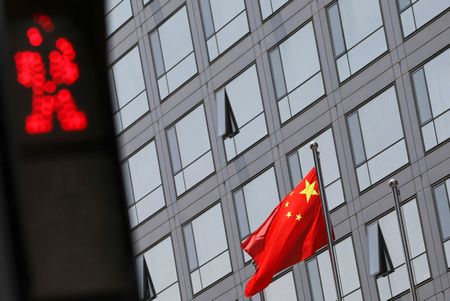 1
1 1
1
HONG KONG (Reuters) -Law firms in China are scrambling to comply with Beijing’s new guidance to tone down the language used to describe China-related business risks in companies’ offshore listing documents, five people familiar with the matter said.
The moves come after China’s securities regulator last month in a closed-door meeting asked domestic law firms to refrain from including negative descriptions of China’s policies or its business and legal environment in the IPO prospectuses.
A failure to do so could mean their listings are not able to get a regulatory nod, the China Securities Regulatory Commission (CSRC) warned, Reuters had first reported, citing people with knowledge of the matter.
The law firms are now racing to change the wordings in some already submitted listing prospectuses and applications yet to be filed, said the five sources, who declined to be identified due to sensitivity of the matter.
Some potential issuers, which have yet to be given the green light from the CSRC, were earlier this month asked by the regulator to tweak the risk factors in their prospectuses to comply with the new offshore listing rules, said one of the sources.
China’s new listing rules, which came into effect in March, stipulate that any “distortion or misinterpretation” on China’s laws and policy, business environment, and judiciary was prohibited.
All major markets require listing aspirants to disclose to prospective investors risks related to the companies themselves, their business sectors, and the countries where they are headquartered in their offering prospectuses.
Beijing’s demand for companies to tone down China business-related risks comes amid the country’s stuttering economy, heightened geopolitical tensions and the government’s sharpened focus on national security.
As part of the changes demanded by the regulator, lawyers are replacing descriptions of “COVID lockdown measures” in IPO applications with “the COVID-19 pandemic” to avoid references to harsh and controversial travel and business curbs during the pandemic, said the second source.
Also, instead of mentioning “foreign exchange control” in some IPO applications, local lawyers in China are proposing to use more neutral phrasing such as “foreign exchange management”, the source added.
Prospective Chinese equity issuers in offshore markets, including the United States, are required to file to the CSRC days after they submit listing applications offshore and need China’s green light to proceed with their fundraisings.
Some of the offshore IPO prospectuses, in which the changes on China risk disclosures are being made, are yet to be filed with the CSRC, the sources said.
The CSRC did not respond to Reuters’ faxed request for comment.
RISK DISCLOSURES
Since the CSRC’s meeting with law firms late last month, at least two IPO applications have tweaked the ways they describe how China makes policy changes, said the first source and a third person.
Those documents now say Chinese policies and regulations can be amended or adjusted from time to time, the two sources said, a marked shift in tone from previous wording that said the government and other local authorities can order rule changes randomly or without prior notice.
Other changes include removing a statement that entails the enforcement of arbitral awards in China is difficult, the first source said, adding, lawyers have instead put a description that China’s judicial system is different from other jurisdictions.
For one prospective Hong Kong listing, lawyers have removed references to uncertainties around China’s regulatory, political and economic environments and foreign exchange control in the prospectus, according to a fourth source.
In revised listing application rules that came into effect on Aug 1, Hong Kong’s bourse removed a section on China risks previously required specifically for mainland-incorporated companies, a move it said would align disclosure rules for all IPO-aspirants.
In response to Reuters’ request for comment, the Hong Kong Stock Exchange said on Tuesday that all listing applicants from all jurisdictions are required under Hong Kong’s listing rules to disclose all material risks, including jurisdictional risks.
“There has been no change to this requirement.”
Four of the sources said the toning down on China business-related risks in the domestic companies’ offshore listing applications could trigger queries from the U.S. Securities and Exchange Commission (SEC), which has warned companies of insufficient China-risk disclosures.
“This is the latest evidence that China is manipulating financial information to hide serious risks and to deceive American investors,” U.S. Senator Marco Rubio told Reuters in a statement on Tuesday.
“We cannot allow Chinese companies to benefit from our capital markets while ignoring our rules…(SEC) Chairman Gensler needs to take action to protect American retirees and investors from these deceptive Chinese firms,” he added.
The SEC did not immediately comment on Rubio’s comments.
(Reporting by Selena Li, Julie Zhu, Kane Wu, and Xie Yu in Hong Kong. Additional reporting by Douglas Gillison. Editing by Sumeet Chatterjee and Sam Holmes)